7 Best Foods to Feed a Large Breed Dog
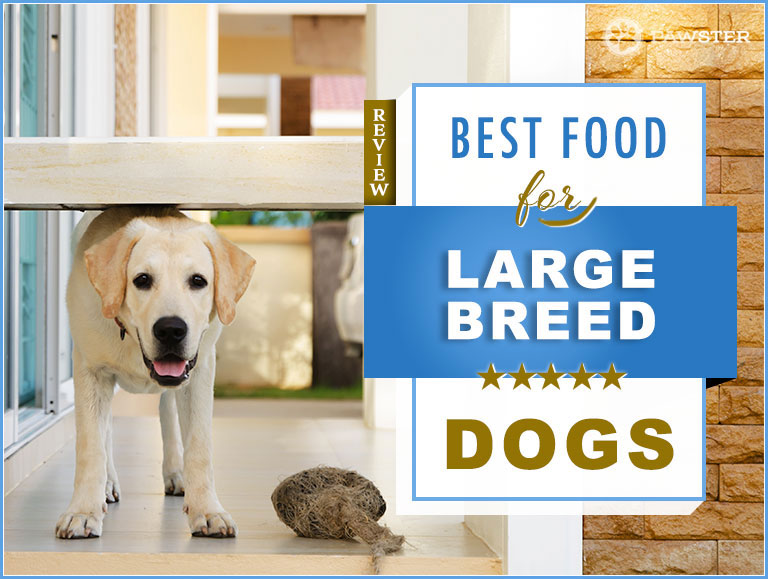
| Sneak Peek: Best Foods For Large Dogs | |||
| Rank | Product | Price | Rating |
| Human Grade |
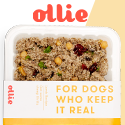 |
Varies |
A+
|
| #1 |
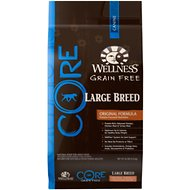 |
$2.48/lb |
A+
|
| #2 |
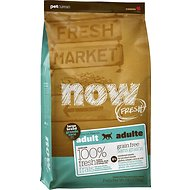 |
$3.15/lb |
A
|
| #3 |
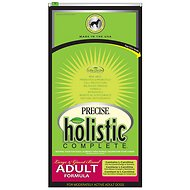 |
$2.45/lb |
A
|
Contents of Article
Lots of people love small dogs but the fact is that large breed dogs have reigned supreme in the United States for decades. Check American Kennel Club statistics and you will discover that the most popular breed in the United States for over 20 years has been the Labrador Retriever – and he’s not alone in popularity. He’s followed by the German Shepherd and the Golden Retriever. Rottweilers and Boxers are also found in the top 10. These big dogs need the best large breed dog food you can give them.
Here are the 7 Best Foods to Feed a Giant Breed Dog
Nutritional Needs for a Large Breed Dog
While all dogs need basic nutrients such as protein, fat, carbohydrates, fiber, vitamins, and minerals, large breeds do have some particular nutritional requirements.
Puppies – Many large breed puppies grow rapidly. Carrying excess weight can put too much stress on their bones and joints. Plus, some large breeds are particularly subject to problems like hip and elbow dysplasia, as well as arthritis later in life. Rapid growth, too much weight, or an imbalance of vitamins and minerals for these puppies can lead to developmental orthopedic diseases such as panosteitis, hypertrophic osteodystrophy (HOD), and osteochondritis dissecans (OCD). For all of these reasons, it’s a good idea to feed large breed puppies a puppy food that is formulated especially for them.
Large breed puppy foods typically have slightly fewer calories than other puppy foods so they are lower in fat. The calcium and phosphorus levels are also adjusted to be lower for large breed puppies. And they have lower vitamin D since vitamin D increases the body’s absorbtion of calcium. By encouraging slow, steady growth in large breed puppies, they can often avoid developmental bone diseases while they are young, as well as problems with hip and elbow dysplasia, and arthritis as adults.
If you have a large breed puppy it’s also important to regulate how much your puppy is eating and feed small meals. Free feeding large breed puppies has been connected to developmental orthopedic diseases.
Adults – Many adult large breed dogs can also benefit from large breed dog foods. Large breed adult dog foods have slightly fewer calories per cup than other dog foods. They are a little less nutrient-dense and for similar reasons as large breed puppy foods. Because many large breed adult dogs can develop hip and elbow dysplasia, along with arthritis, it’s very important for these dogs to stay slim. Carrying extra weight can increase the chances of a large breed dog developing bone and joint problems.
Large breed dog foods also often include supplements such as glucosamine, chondroitin, green-lipped mussels, SAM-e, and other ingredients which are believed to help reduce or prevent bone and joint problems. There is some debate about whether these supplements really work – the scientific research is inconclusive – but many dog owners are convinced that they do help their dogs. Whether dog foods actually contain enough of these supplements to be helpful is another question. If your dog has a joint problem such as arthritis, you would probably need to buy your own supplements to add to his diet if you really want to see some benefits. You can buy these supplements over-the-counter at any pharmacy or online.
You should be aware that not every individual dog of a large breed will grow to be a very large dog. Just because many Labrador Retrievers are 70 pounds, or more, doesn’t mean that they are all this large. For example, smaller Lab females may weigh 55+/- pounds. If you have a large breed dog on the smaller side for the breed, you may want to feed a regular dog food. You don’t have to feed a large breed dog food to every large breed dog.
Some large breeds are also prone to bloat. Bloat, or gastric dilatation and volvulus, is a life-threatening condition that involves the stomach filling with air or fluid and twisting. This cuts off the blood supply to the stomach and intestines which leads to shock and then death. Bloat is an emergency. You should get your dog to the vet immediately when you see the signs. There are no specific foods to feed a dog to avoid bloat, though feeding a good quality dog food is recommended. Other suggestions include:
- Avoid foods that have fat or oil as one of the first four ingredients.
- Choose foods with larger kibble sizes.
- Don’t let your dog exercise strenuously for 1-2 hours after eating.
- Don’t mix dry food and water together.
- Don’t use a raised feeder or stand.
- Feed your large breed dog several smaller meals instead of one big meal per day.
- Use a slow feed bowl to encourage your dog to eat more slowly so he won’t gulp down air while he’s eating.
What to Look For in a Good Large Breed Dog Food
In many ways a good large breed dog food is similar to other good quality dog foods but there are a few differences.
Protein – Like other dogs, large breed dogs need good protein from good sources in their diet. At one time there was a belief that the protein of large dogs should be limited. It was thought that it might be associated with hip dysplasia or other bone and joint problems in these dogs. Research has shown that it’s not protein but obesity and calcium levels which contribute to bone and joint problems. AAFCO recommends a minimum of 18 percent protein in the diet for adult dogs; and 22 percent protein in a growth and reproduction diet. Most dog foods today exceed these percentages. That shouldn’t be a problem for a healthy adult large breed dog. However, you will probably find that many large breed adult dog foods have lower protein percentages than other good quality dog foods. We’re not sure why this is the case because there is no nutritional basis for feeding large breed dogs lower protein levels than other dogs. The only time more protein becomes a problem is if you are feeding a raw or homecooked diet and the calcium/phosphorus levels are not balanced; or there is too much fat in the diet which can sometimes happen with raw or homecooked diets. A dry matter protein percentage of 30 percent is perfectly fine for many large breed puppies.
Fat – Large breed dogs and puppies do need to watch their weight at all times. As previously mentioned, carrying extra weight can lead to bone and joint problems at any time of life for these dogs. Consequently, you should look for large breed dog foods that have less fat than other foods. AAFCO recommends that adult dogs have a minimum of 5 percent fat in their diet for maintenance; growth and reproduction diets should have a minimum of 8 percent. Most dog foods today far exceed these percentages. Many large breed adult dog foods have crude fat percentages around 12-13 percent which is lower than most good quality dog foods. Large breed puppy foods have crude fat percentages ranging from 10-15 percent so you need to check the guaranteed analysis and, preferably, figure out how the dry matter basis for the food so you know the real fat content in the food. A dry matter basis percentage of 9 percent is good for many large breed puppies.
Calcium – Large breed dogs and puppies do need to have foods that have had their calcium levels lowered. Many people think that since these are big dogs and they often grow for a long time that they need more calcium. In fact, the opposite is true. Too much calcium for a large breed puppy can lead to bone problems such as osteochondrosis dissecans (OCD) and other developmental diseases. Researchers recommend that you look for a dry matter calcium percentage of 1.5 percent. The calcium:phosphorus ration should be between 1:1 and 1.3:1 for large breed puppies.
Puppies: no supplements, please
Do not add supplements to your large breed puppy’s diet. No yogurt, cottage cheese, multivitamins, or other things. Your puppy’s food should be “complete and balanced.” If you add things to it, it won’t be. Large breed puppies are particularly sensitive to certain levels of vitamins and minerals. When you add supplements to his diet, you risk throwing his growth out of balance which can lead to disease in both the short and long term.
Adults: glucosamine and chondroitin
Adult large breed dogs may benefit from foods that have supplements such as glucosamine and chondroitin added. Dog food companies usually mention on the label if the food includes these supplements though the FDA does not allow them to make any serious health claims about them.
AAFCO – There are currently not any guidelines or regulations for adult large breed dog foods from AAFCO. AAFCO does require dog foods that are labeled for “growth” to state whether they comply with new regulations for large and giant breed puppies about calcium levels.
3 Best Large Breed Puppy Foods
| Rank | Product | Price | Rating |
| Human Grade |
 |
Varies |
A+
|
| #1 |
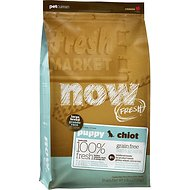 |
$3.15/lb |
A+
|
| #2 |
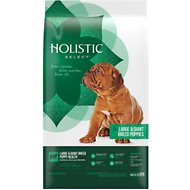 |
$1.99/lb |
A
|
| #3 |
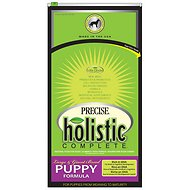 |
$2.05/lb |
A
|
Now Fresh Large Breed Grain Free Puppy
First 5 Ingredients : De-Boned Turkey, Whole Dried Egg, Potatoes, Peas, Potato Flour
Now Fresh Large Breed Puppy food is made with 100 percent fresh turkey, salmon, and duck. It also has fresh omega 3 and 6 oils. This food has zero grains, gluten, wheat, beef, corn or soy. And it has no rendered meats, by-products or artificial preservatives. It has the right calcium and phosphorus levels for your large breed puppy; and green mussels for hip and joint health. Plus, it has plenty of protein and modest fat levels for your puppy, with 379 kcal/cup. We think this is a good food for many large breed puppies.
Holistic Select Large & Giant Breed Puppy Health
First 5 Ingredients : Lamb Meal, Ground Brown Rice, Ground White Rice, Chicken Meal, Dried Beet Pulp
Holistic Select Large & Giant Breed Puppy Health comes in a lamb and oatmeal recipe, and it includes chicken and fish. It has DHA for brain and eye development. The first five ingredients in the food are: lamb meal, ground brown rice, ground white rice, chicken meal, and dried beet pulp. The food has 23 percent crude protein and 12 percent crude fat with 375 kcal/cup – these lower percentages and calories encourage slow growth in large puppies. Holistic Select has several good kibble and canned foods including a grain free puppy food with higher protein and fat percentages.
Precise Large & Giant Breed Puppy
First 5 Ingredients : Chicken, Chicken Meal, Ground Brown Rice, Oatmeal, Lamb Meal
Precise Large & Giant Breed Puppy has 400 kcal/cup, 23 percent crude protein, and 12 percent crude fat. The first five ingredients in this food are: chicken, chicken meal, ground brown rice, oatmeal, and lamb meal. It has three kinds of protein for your growing puppy and it has the proper calcium:phosphorus balance. Precise has a good reputation for making large and giant breed foods.
3 Best Large Breed Adult Foods
| Rank | Product | Price | Rating |
| #1 |
 |
$2.48/lb |
A+
|
| #2 |
 |
$3.15/lb |
A
|
| #3 |
 |
$2.45/lb |
A
|
Wellness CORE Grain Free Large Breed
First 5 Ingredients : Deboned Chicken, Chicken Meal, Turkey Meal, Potatoes, Peas
This large breed formula is high in protein with low/moderate fat – just 346 kcal/cup – to keep large breed dogs slim and healthy. It has glucosamine and chondroitin for joint support; and larger kibble pieces so your dog won’t gulp down food. The first five ingredients are: deboned chicken, chicken meal, turkey meal, potatoes, and peas. This formula would be a good choice for lots of large breeds.
Now Fresh Grain Free Large Breed Adult Recipe
First 5 Ingredients : De-Boned Turkey, Whole Dried Egg, Potatoes, Peas, Potato Flour
Now Fresh Grain Free Large Breed Adult uses 100 percent fresh turkey, salmon, and duck. It has just 363 kcal/cup. The food has no grains, wheat, beef, corn, or soy, so it can also be a good choice for dogs with allergies or food sensitivities. It also has supplements for good hip and joint health. This food can be a good choice for large breed dogs that are less active and don’t need as many calories.
Precise Holistic Complete Large & Giant Breed Adult
First 5 Ingredients : Chicken, Chicken Meal, Ground Brown Rice, Oatmeal, Chicken Fat
Precise Holistic Complete Large & Giant Breed Adult formula has triple proteins and the calcium and phosphorus levels have been adjusted for large breed adult dogs. The first five ingredients are: chicken, chicken meal, ground brown rice, oatmeal, and chicken fat (preserved with mixed tocopherols and ascorbyl palmitate). This food has moderate protein and fat with slightly more calories per cup than some large/giant breed foods (417 kcal/cup).
Conclusion
If you’re trying to choose a good large breed dog food remember that you need to keep your big dog slim so he won’t put excess weight on his bones and joints that could lead to musculoskeletal problems. Protein from good sources is fine but you do need to be careful about feeding your dog too much fat. Check the calcium level in the food, too. And, if you have a breed that is prone to bloating, take precautions to encourage your dog to eat slowly and rest after eating.
We hope the information provided here is helpful for you. If you need for recommendations about the best foods for your dog, check our reviews here on Pawster!

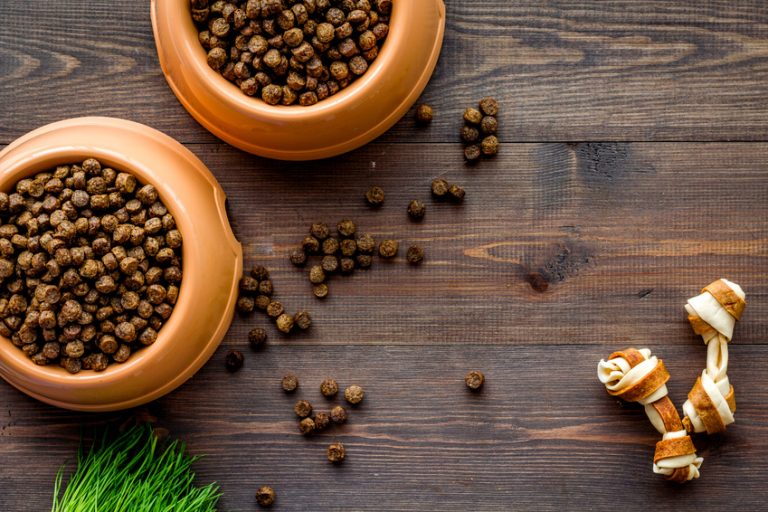
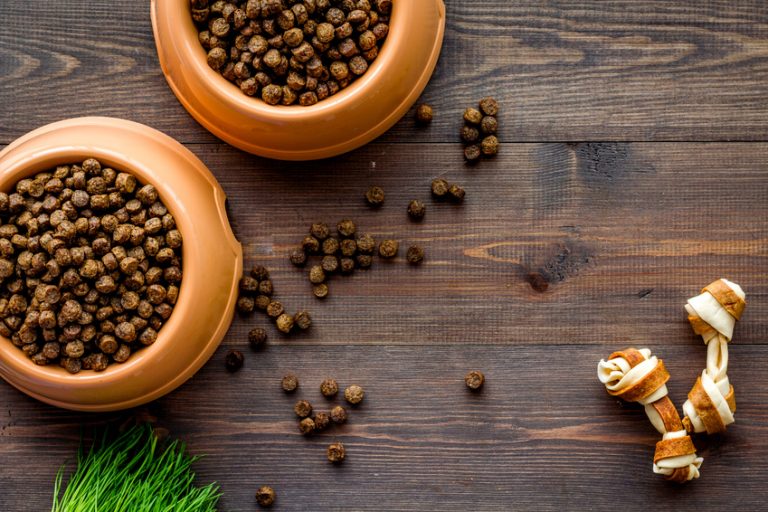
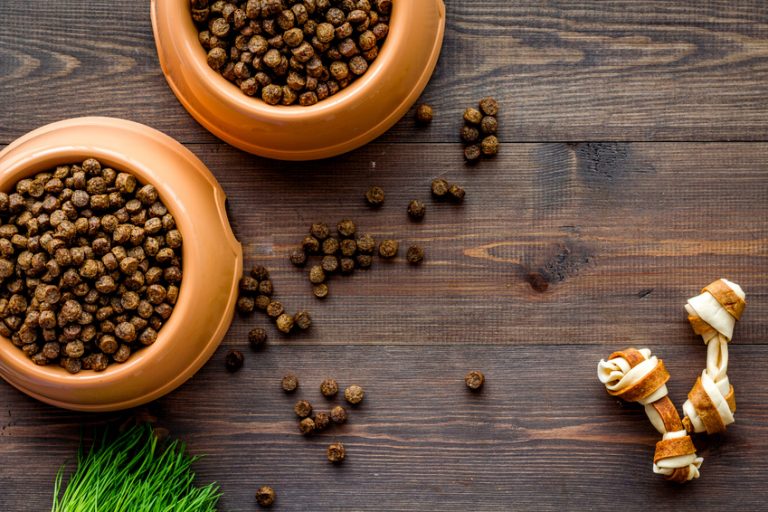
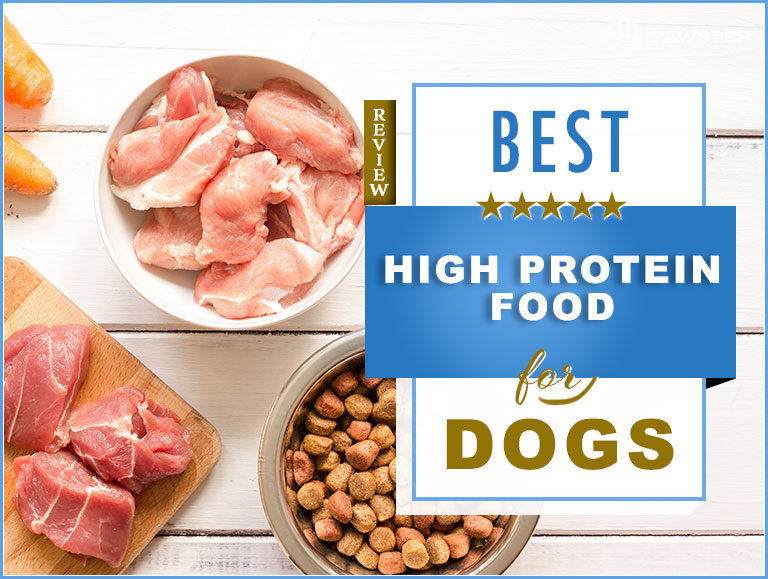
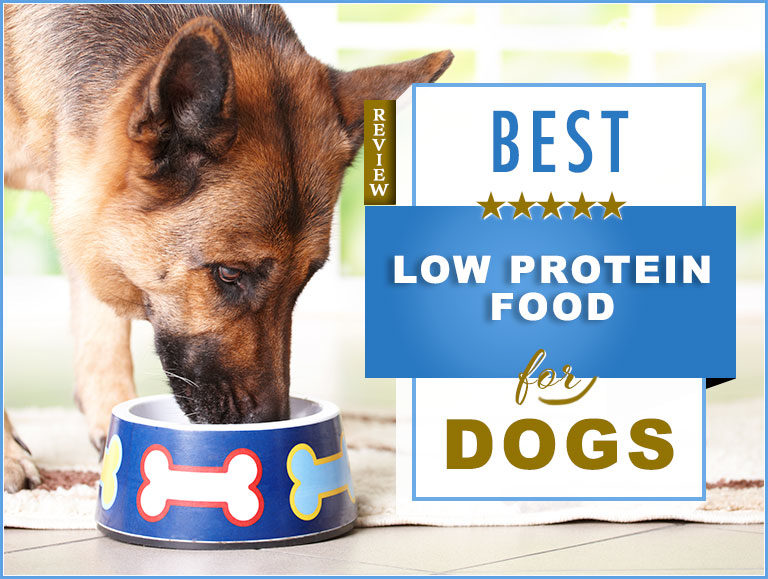
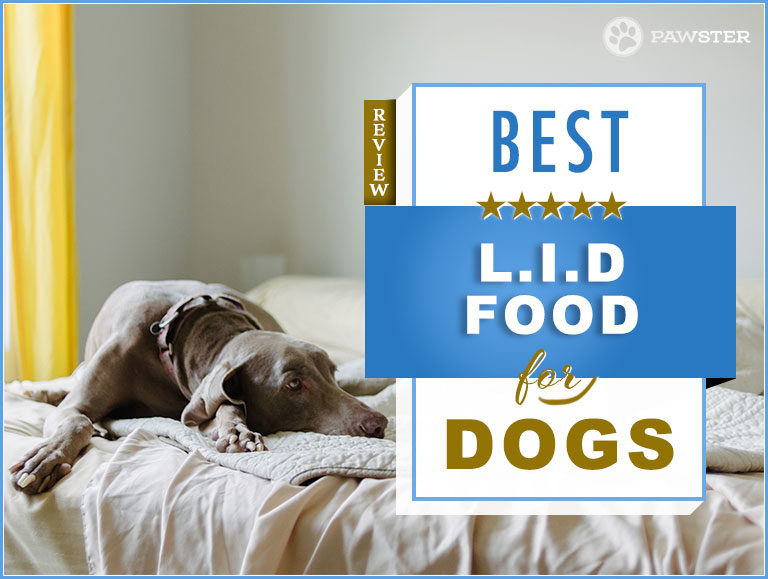
Hello Carlotta,
I love the suggestions you provided in this article. They all look like high quality dog foods. I was just wondering, what would your suggestion be for the best large breed dog food that I could purchase in the store? I can’t find any of the foods you recommended at my local PetSmart or Petco stores. I’m happy to order online but I really don’t want to do it all the time since I live down a long driveway and the delivery guy walks down it to delivery packages instead of driving his truck down. He would kill me if he had to deliver 50 lb bags of dog food. LOL!